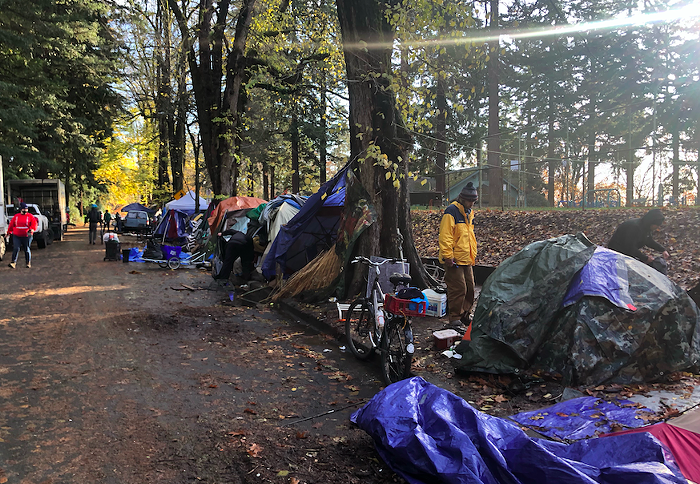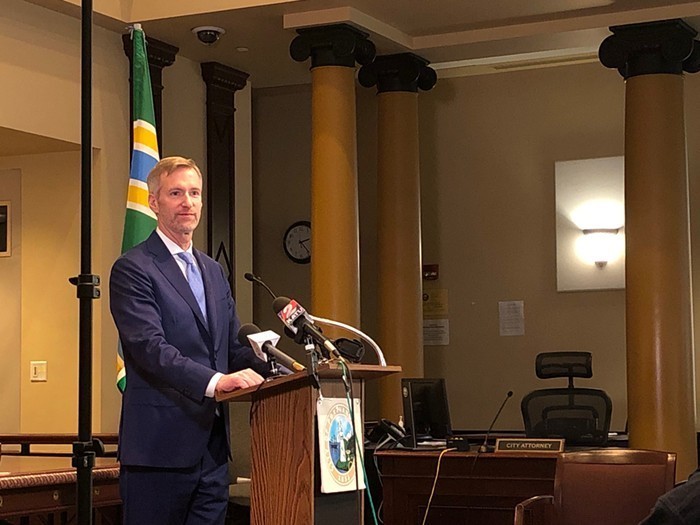
It was two in the morning and pouring down rain when Michael was told to pack up her home and move.
She was camping in the courtyard of St. Francis church at SE 12th and Pine, a space that’s regularly occupied by houseless Portlanders.
“It's just one thing after the other,” she said, wiping her eyes as she recalled the encounter. Michael, who asked the Mercury only use her first name, says her belongings have been lost—or destroyed—by police in the past. Last month during a sweep, the Portland native lost her cookstove and food, and is still missing her dentures.
But this time, it was not police harassing her, but private security guards paid with public parking dollars.
Every night since August 2018, a security guard has patrolled a five block radius around St. Francis Catholic Church, a regular community hub for Portland’s homeless population living in the Central Eastside. The security guards are part of a temporary pilot program organized by the Central Eastside Industrial Council (CEIC), an organization comprised of people who own or run businesses in the area bordered by the Willamette River, SE 12th, Powell Ave, and I-84.
The guards' goal: To improve the so-called “livability” of the district. Or, according to the CEIC’s annual budget, addressing “a substantial increase in the number of camps, campers and, at times, people with disruptive behavior that are creating a growing sense of insecurity to businesses, employees, residents and users of the district.”
Homeless Portlanders and houseless advocates believe the CEIC's efforts are misguided. To them, the security program and other projects prioritized by CEIC are simply thinly-veiled attempts to push homeless Portlanders out of their neighborhood.
“I feel like they just want me to give up,” Michael says, referring to the constant policing. “It’s my neighborhood too.”
The Portland City Council is poised to approve a new plan that would allow this security team to become a permanent fixture across the entire Central Eastside—and forfeit public oversight in the process.
Since passing a sweeping Parking Management Plan in 2012, the Portland Bureau of Transportation (PBOT) has allowed the CEIC to address the difficulty of finding parking in its district, and ultimately discourage car traffic, through a combination of parking meters and parking permits.
“I feel like they just want me to give up. It’s my neighborhood too.”
PBOT lets the group raise permit fees and meter prices to make parking increasingly expensive in their neighborhood if they use those funds to improve the alternatives to driving, like bike lanes, sidewalks, and public transportation options. The security program doesn't obviously fit into those categories.
The CEIC justified the program in their latest budget saying that people reportedly felt unsafe in the Central Eastside walking to public transit, and dim lighting, sidewalk trash, and graffiti were to blame. These issues could be addressed, the CEIC argued, with a security patrol. The CEIC declined to be interviewed for this story.
Earlier this month, Portland City Council passed new regulations on how, exactly, these parking funds could be used to support transportation alternatives. Multiple items from the CEIC’s budget, like graffiti removal and private security, are absent from the list.
Juliana Lukasic, a CEIC consultant, testified during the council hearing that preceded the January 9 vote. “The Central Eastside is an example of the broader use of a permit surcharge,” she said. “We have used it to promote cleanup and safety on our right of ways.”
Her testimony sparked several clarifying questions from city commissioners. “I’m confused,” said Commissioner Amanda Fritz. “It doesn't seem to me that this is an allowable use of surcharge money.”
But, since the CEIC is already two years into a five year agreement with PBOT, the organization doesn't have to adhere to the new rules. And it's hoping to keep it that way.

The CEIC is striving to gain total control of how it patrols and polices its neighborhood. On January 30, Portland City Council will hear CEIC’s pitch for an Enhanced Services District (ESD), a program that would require property owners pay into a private fund for "neighborhood improvement programs". One of those programs includes a security team to "document and address crime" across the entire Central Eastside. Since the funds are private, and not gathered through parking fees, they don't have to align with the new city regulations.
Part of CEIC’s initial goal is working. A recent parking study funded by the CEIC showed that even during the busiest time of the day, curbside parking in the Central Eastside has dropped from 88.7 percent in 2016 to 78 percent in 2018—well below the city's target rate of 85 percent.
It’s less clear how the funds collected from this program are being used. In 2015, the CEIC added a $10 surcharge on top of the $60 charged by the city for an annual parking permit. That initial surcharge allowed the CEIC to collect parking data and hire a part-time employee to oversee the program. The surcharge has been raised every year since, now up to $240 per year, and the CEIC now oversees a $1.4 million annual revenue stream.
In its 2019 budget, the CEIC reported that it had $700,000 in unused funds from the prior year. A public records request for expenditures only turned up invoices for a handful of expenses like administrative staff, the security pilot program, and the seldom used shuttle that the Mercury reported on in August.
Sixteen percent of the CEIC budget goes toward PBOT’s “transportation wallet,” a program that incentivizes alternatives to driving by offering TriMet, Portland Streetcar, and Biketown passes to people who work in the Central Eastside, in lieu of a parking permit.
“Until we start creating policies that allow people to live somewhere, nothing is going to change.”
But more than double that—at 39 percent of the CEIC budget—goes to programs that includes the private security pilot project, a new graffiti removal program, and funding for Central City Concern’s Clean and Safe, a program that currently works to removes trash and graffiti from downtown Portland and pays security officers to patrol sidewalks.
Sandra Comstock, a homeless advocate with Right 2 Survive, doesn't think these programs are an effective use of public funds.
“Businesses in the Central Eastside think they can solve our broken system through additional private police and cleaning forces that replicate the confiscation of life-sustaining items,” she says. “We think that's the wrong approach.”
That's why Comstock has joined a coalition of advocacy groups who drafted an alternative roadmap for CEIC’s parking fee-funded programming, and are trying to build support to turn the CEIC district into a “Compassionate Change District”. Instead of paying for more security, the proposal suggests funding programs that provide vital services to the houseless community, such as a waste collection program, additional public bathrooms, and designated camping and parking areas where homeless residents can safely spend the night.
The proposal is meant to be an alternative to the CEIC’s pitch for the ESD.
The CEIC, meanwhile, is investing in the ESD’s success. From August to November, the CEIC spent more than $37,000 of parking funds on consultant fees, informational mailers, and a catered rooftop party in September. If passed, the ESD is expected to raise $1.2 million annually for the CEIC.
“We stand at a crossroads,” Comstock said about the upcoming ESD council vote. Advocates for the Compassionate Change District are still looking for a seat at the table, and are asking for a governance structure that includes representatives from the entire community. City officials are listening.
This evening, staff from Commissioner Jo Ann Hardesty's office will present a proposal that takes ideas from both the ESD and Compassionate Change District during Right 2 Survive's monthly meeting. The potential tweaks to the CEIC plans are expected to reflect Hardesty's support of Portland's houseless community. The meeting will take place at Sisters of the Road at 5 pm.
“Until we start creating policies that allow people to live somewhere,” Comstock said, “nothing is going to change.”

















